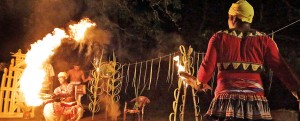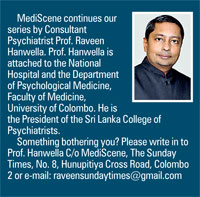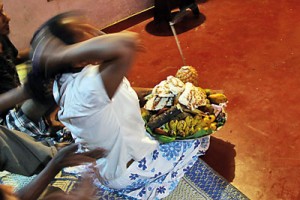When the psychiatrist successfully challenged the unknown spirits
View(s):By Prof. Raveen Hanwella
A few months ago, I travelled with our faithful domestic aide to her village for her regular visit home. On turning into the road leading to her house I noticed a gokkola decoration at the road junction. Near her neighbours’ house there was a more elaborate structure with provision for lighting of lamps. On inquiry I was told that one of the girls in that house had been possessed by the spirit of her grandfather.

A Thovil in progress to exorcise the spirits from the allegedly possessed patient (inset)
My curiosity aroused, I interviewed the family. The grandfather had died one year ago. The girl had sat the A’ Levels in August and awaiting her results was attending English classes. Just prior to her examination she had contracted dengue but recovered sufficiently to sit the examination. In September while attending her classes she had fainted. This was repeated at home but this time, during the episode, she had started talking in a strange voice which the family thought, resembled her grandfather’s. On recovery she had no memory for the episode.
The family consulted the local exorcist who in a trance confirmed that the spirit of her grandfather has possessed the girl. During the ritual the girl too went into a trance and showed characteristics similar to her dead grandfather in her voice and gait. This reinforced the belief that it was indeed the grandfather’s spirit that possessed her.
It is not often that psychiatrists are consulted for a possession state. It is likely that people do not see it as a disorder that falls within the psychiatrists’ province. If you were to look up the DSM 5, the latest classification of mental illness, you will not find a reference to possession states in the main headings. On my bookshelf is a rather rare book now out of print. It is called Uncommon Psychiatric Syndromes. Written in the 1960s by a renowned psychiatrist of his time Prof. Sir William Trethowan, it describes ten psychiatric disorders considered unusual or exotic. Of these the tenth is on possession states.
Prof. Trethowan rather apologetically states, “Although the last may be thought of as a rather exotic inclusion, experience has shown that even in the United Kingdom – as in other Westernised societies – there is still a wide variety of conditions, … which may occasionally be encountered in clinical practice.”
 Returning to the story of the possessed girl in our domestic aide’s village, after the initial ritual, it was recommended that a thovil ceremony be performed to exorcise the grandfather’s spirit and protect the house. Afterwards he also asked the family to set apart a place in the house for the girl to daily light three lamps to three deities, namely goddesses Paththini and Bhadrakali, and Gambara Deiyo (literally the deity in charge of the village). The mother told me, in rather hushed tones, that during this lighting ceremony, the daughter walked just like the grandfather! She also went intermittently into trance states and afterwards could not do any work as she felt very weak. These injunctions severely restricted the life of the family. As the lamps had to be lit daily the family could not go for a holiday even for a single night.
Returning to the story of the possessed girl in our domestic aide’s village, after the initial ritual, it was recommended that a thovil ceremony be performed to exorcise the grandfather’s spirit and protect the house. Afterwards he also asked the family to set apart a place in the house for the girl to daily light three lamps to three deities, namely goddesses Paththini and Bhadrakali, and Gambara Deiyo (literally the deity in charge of the village). The mother told me, in rather hushed tones, that during this lighting ceremony, the daughter walked just like the grandfather! She also went intermittently into trance states and afterwards could not do any work as she felt very weak. These injunctions severely restricted the life of the family. As the lamps had to be lit daily the family could not go for a holiday even for a single night.
The girl’s day to day life was also hampered as the parents feared that she would go into one of her trances at any time, fall and injure herself. Whereas before she had freely travelled to her classes by bus and also visited her friends, she was now accompanied everywhere by one of her parents. She was not allowed to use public transport and was conveyed by three-wheeler, adding to the economic burden of the family. I also found that the family had spent over Rs. 150,000 for rituals and ceremonies. A rather munificent amount for a poor family.
Having listened to the story I offered to assess her in the Colombo University Psychiatry Unit. Though reluctant at first, under pressure from our domestic aide – a respected village elder, and also perhaps out of desperation – the spirit not having departed yet, the family complied, and the mother and daughter arrived in our unit the week after. My team assessed her and carefully took a detailed history and carried out a mental state examination to rule out any hidden stresses in her life and also to exclude any psychiatric disorder such as depression and a neurological problem like epilepsy. We could not find any such underlying problems.
Afterwards it was over to me for the therapy. No sophisticated analysis was necessary. My formulation was that the initial episode was probably a faint brought on as an aftermath of the dengue infection and the stress of the examination. The subsequent drama and attention and the supernatural explanation given by the Kattadiya, fostered by her family’s cultural beliefs perpetuated the subsequent behaviours.
 However directly offering such a formulation to a person usually does not bring results. I took a more indirect approach. I discussed with her the serious disruption caused to her life by her episodes of possession and the required rituals. She could not travel freely by herself, she was restricted in her visits to friends, and she could not be away from her house for even a single night as she had to light the three lamps daily. Directly challenging her belief in spirits and banning the rituals would have been too threatening and I suggested a compromise solution. I instructed the mother to light the lamps on behalf of the daughter. I also suggested that if there were no further episodes the mother could light the lamps twice a week and on the days in between the family take a holiday away from their home.
However directly offering such a formulation to a person usually does not bring results. I took a more indirect approach. I discussed with her the serious disruption caused to her life by her episodes of possession and the required rituals. She could not travel freely by herself, she was restricted in her visits to friends, and she could not be away from her house for even a single night as she had to light the three lamps daily. Directly challenging her belief in spirits and banning the rituals would have been too threatening and I suggested a compromise solution. I instructed the mother to light the lamps on behalf of the daughter. I also suggested that if there were no further episodes the mother could light the lamps twice a week and on the days in between the family take a holiday away from their home.
Three weeks later, curious about the outcome of my interventions, I requested our domestic aide to contact them by telephone. After calling, she happily reported that the girl was now free of symptoms. She had returned to her classes and was travelling alone by bus. The mother continued to light the lamps, but only twice a week, and the family, had followed my advice and gone on a holiday to Anuradhapura and just returned home! It was a better outcome than I could ever have hoped for. The psychiatrist has successfully challenged the spirits.
I end with the wise words of Prof. William Trethowan, “Like the fairies in Peter Pan… depend for their existence or annihilation on a vote of confidence of the audience, so it is with a wide range of superstitions and prejudicial beliefs, many of which, if not actually harmful, bring little benefit to mankind.”
Get help
If any person having a family member suffering from a “possession state” wishes to avail themselves of the services of the Colombo University’s Psychiatry Unit, please telephone the reception of the University Psychiatry Unit on 011 2691111 extension 2279 between 8.30 a.m. and 4 p.m. on weekdays and Saturdays between 8.30 a.m. and 12.30 pm.
An appointment will be given to consult their team. This service is free of charge.


